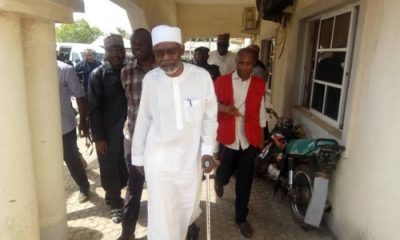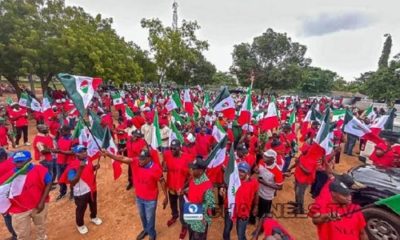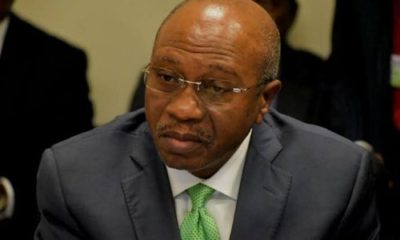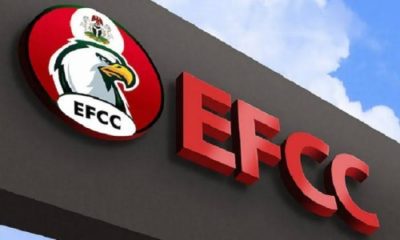Finance
NDDC diverted N183bn Niger Delta development money, Auditor General insists
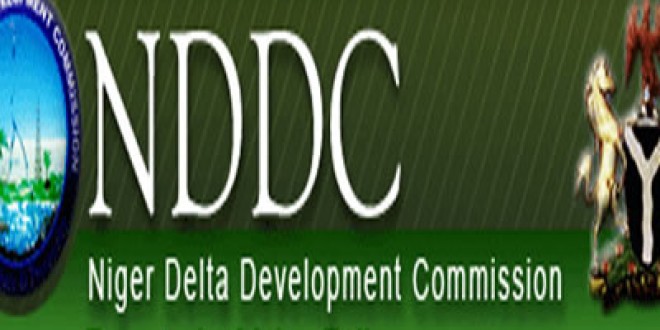
ABUJA-AT least N183 billion that was meant for the development of Nigeria’s oil rich Niger Delta, was diverted by those put in charge of the government development commission for the area, the Auditor General of the Federation, Samuel Ukura said Wednesday.
Mr. Ukura insisted on the veracity of his special audit report accusing the management of the Niger Delta Development Commission, NDDC, of diverting the money.
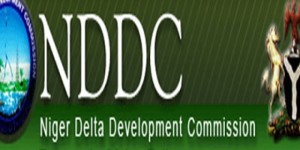 The Auditor General said his office stood by the report and directed those not satisfied to be prepared to defend their position before a special committee of the National Assembly.
The Auditor General said his office stood by the report and directed those not satisfied to be prepared to defend their position before a special committee of the National Assembly.
“The Office of the Auditor-General for the Federation stands by the Special Periodic Checks on the NDDC and its contents. Any person or corporate organization not satisfied has the opportunity to defend itself before the Public Accounts Committees (PACs) of the National Assembly,” said a statement by a spokesperson for the office, O.A.Ogunmosunle.
The auditor general had earlier made his findings about the money known to the National Assembly, as constitutionally required.
Following the reports, which urged the lawmakers to take immediate steps to recover the missing money, the NDDC took to the media to discredit the report, dismissing it as “very misleading and untrue”.
The Executive Director, Finance and Administration of the Commission, Henry Ogiri, who described the report as “premature and misinforming”, said the report tended to accuse the current NDDC management of being responsible for the alleged missing money.
“I say without fear of contradiction that the Auditor-General’s report is premature,” Mr. Ogiri said. “I say this because we are already putting together the responses to the queries which were directed to a period we were not in the Commission.”
“I completely disagree with the Auditor-General on this issue. Some of the claims he made in his report are things that do not hold water as at today. I do not believe that there is any money missing.”
However, the Office of the Auditor-General said it took serious exception to attempts by the NDDC to not only deny the allegations, but also casting aspersions on the integrity of the Special Periodic audit submitted to the National Assembly.
In a strongly worded statement in Abuja, the OAuGF said the reaction was compelled by the negative sentiments occasioned by the NDDC’s condemnation of the Special report “calculated to demean the efficacy of the Constitutional mandate carried out by the Office of the Auditor-General for the Federation.”
“It is noteworthy to state that it took NDDC16 months to grant the Office permission to commence the periodic checks beginning from 9th December, 2011 to 6th May, 2013,” the statement said.
“Similarly, it took another 16 months and several reminders to the NDDC with effect from the 24th of April, 2014 to 12th August, 2015 before the final report was submitted to the National Assembly.
“It may interest the reading public to know that at the time of this Press Release (Wednesday), the NDDC is yet to respond to the Special Periodic Checks.”
Reminding the public of the constitutional mandate of the Office of the Auditor General of the Federation to submit its reports to the National Assembly periodically, Mrs.Ogunmosunle said in doing so, due process is usually followed.
In the three special audit reports submitted to the Clerk of the National Assembly, Salisu Maikasuwa, Mr. Ukura had noted that the N183.7 billion was discovered to be missing during the periodic checks carried out by his office on the activities and programmes of the Commission between 2008 and 2012.
While about N70.4 billion was paid as mobilization to various contractors that never showed up at to site to do the job, he said another N90.4 billion was discovered to be extra-budgetary expenditure “for Head and Sub-heads without approval by the legal authorities.”
Equally, the sum of N10 billion was recorded in the books as tax deductions without evidence of remittance to the Federal Inland Revenue Service (FIRS), while about N5.8 billion was said to have been paid to contractors for projects not executed, stalled or abandoned, in addition to N1.2 billion as taxes not deducted from contractors.
Again, the report said about N3.1 billion consisted of transfers to some unauthorized accounts, while N1.7 billion was outstanding staff advances never accounted for.
Also, there was no evidence that about N785million out of N1.1 billion budgeted for the supply of furniture to various schools in Delta State was spent on the project, despite being certified as paid.
Banking
CBN Denies Currency Devaluation

The Central Bank of Nigeria (CBN) has refuted claims of devaluing the.
Earlier reports suggested that the CBN had devalued the Naira, lowering its exchange rate from N631 to the dollar, compared to the previous day’s rate of N461.60 at the Importers and Exporters (I&E) window.
However, the Central Bank of Nigeria (CBN) released a statement on Thursday through its Acting Head of Corporate Communications, Dr. Isa Abdulmumin, categorizing the report as false information.
In the statement titled ‘CBN Has Not Devalued The Naira’, he said the attention of the apex bank was drawn to the news report by an Abuja based newspaper edition of June 1, 2023, titled “CB Devalues Naira To 630/51”.
However, the CBN stated categorically that the news report was replete with outright FALSEHOODS and destabilizing innuendos, ‘reflecting potentially willful ignorance of the said medium as to the workings of the Nigerian Foreign Exchange Market.’
“For the avoidance of doubt, the exchange rate at the Investors’ & Exporters (I&E) window traded this morning (June 1, 2023) at N465/USS1 and has been stable around this rate for a while.
“The public is hereby advised to ignore the news report by Daily Trust in its entirety, as it is speculative and calculated at causing panic in the market,” the CBN spokesman added.
He, therefore, advised media practitioners to verify their facts from the Central Bank of Nigeria before publishing in order not to misinform the public.
Banking
BREAKING: CBN Increases Interest Rate By 0.5%

The interest rate in Nigeria has been raised to 18.5 percent, up by 0.5 percent, from 18 percent where it was pegged in March 2023.
The Central Banks of Nigeria’s (CBN) Monetary Policy Committee (MPC) resolved to this effect at its third meeting of 2023 in Abuja, on Wednesday.
Governor, CBN, Godwin Emefiele, made the disclosure in the communiqué of the MPC’s meeting, thereafter.
While engaging the media at the end of the two-day meeting, Emefiele, said the committee voted to keep the asymmetric corridor at +100 and -700 basis points around the MPR.
In the view of the MPC, rising inflation rate is traceable to the high energy cost and challenges around the supply chain, among others, which lie outside the corridors of the CBN.
Emefiele said, “The current trend in price development would continue to be monitored by the bank with greater collaboration with fiscal authority to address the drivers of inflation.”
Biztellers reports that the CBN had effected six consecutive interest rate increases, which has seen the rate move from 11.5 percent in March 2022 to 18.5 percent in May 2023.
Finance
Dangers Lurk As Nigerians Resort To Refurbished Gas Cylinders

In Nigeria, people have been forced to come up with creative solutions to cope with the effects of inflation and the economic crisis.
These improvised strategies have not only helped individuals save money, but also enabled them to stay afloat during difficult times.
In a concerning development, the recent trend of boycotting the high cost of cooking gas cylinders in Nigeria may pose a greater risk to lives than it does in terms of saving money.
Economy&Lifestyle investigations have revealed that the soaring prices of gas cylinders have reached a point where it has become increasingly challenging for average households to afford them, let alone refill them with gas.
The situation is further exacerbated by the fact that the pump price of kerosene, which would typically serve as an alternative, has become prohibitively expensive.
Upon investigation, it was found that the prices of gas cylinders vary depending on their sizes. A 3kg gas cylinder is priced at N14,000, while a 5kg cylinder costs N16,000. The larger cylinders are even more costly, with a 6kg cylinder priced at N17,000 and a 12.5kg cylinder costing N19,000.
Additionally, the expense continues when it comes to filling these cylinders with cooking gas, as it costs N2,600 for a 3kg cylinder, N5,200 for a 6kg cylinder, N8,950 for a 10.5kg cylinder, and N10,650 for a 12.5kg cylinder.
Consequently, an average household that needs to replace a worn-out 5kg cylinder would have to come up with N20,250 to purchase a new cylinder and fill it with gas, which can be a difficult feat to achieve.
As a result, many people have resorted to refurbishing their old cylinders and trying to use them as best as they can. However, this approach poses a significant danger.
Mrs. Rukayat Adesoji, a trader, shared her experience regarding her gas cylinder, which had become rusted and could no longer stand upright since last month. Due to the exorbitant prices of purchasing new cylinders, she resorted to seeking the assistance of a welder.
The welder patched the legs of the cylinder, repainted it, and ever since then, she has been using the refurbished cylinder for her cooking needs.
She said ““My gas cylinder which was 6kg got rusted and no longer stands erect since last month. When I asked for the price, I was told it was N17, 500. I was discussing it with a friend who advised me to take it to a welder to paint it and construct a new stand. I heeded to her advice and at the end spent just N3, 000 to turn my cooking gas to a brand new.”
Apart from refurbishing cylinders, some people don’t even know when their cylinders will expire. Mrs. Mercy Opara, a hair stylist, falls in that category as she explained: “I am taking my gas cylinder to the welder to spray it for me. It just cost N1, 500.
“The cost of buying a new cylinder is high. I have been using my cylinder for over 7 years and I don’t even know the expiry date. I just pray God blesses me so that I can buy a new one. But this one I am managing will look neat after spraying it for another two years.”
Mr. Adekanbi Joseph, a wielder, said he paints cylinder and “To paint and rebuild a cylinder stand, I charge N4, 500. Many people come here to paint as a new cylinder is now very expensive to get.”
Highlighting the potential dangers of using refurbished cylinders, Mr. Benjamin Hope, the Chief Executive Officer of FKT Cooking gas and general goods, emphasized the risks involved.
He stated that even a brand new cylinder can pose a risk of explosion if the locks are not properly secured after use or if the cylinder filled with gas is moved from one location to another.
He said “A brand new cylinder can explode if the locks are not well keyed after using and if the cylinder filled with gas was moved from one place.
“There are many reasons for the high cost of gas cylinders in Nigeria. One is the cost of importation due to the exchange rate. Another is the increased migration from the use of kerosene to cooking gas which has necessitated increased demand for gas cylinders. You know that in such a case there will be increased importation of cylinders.”he added

